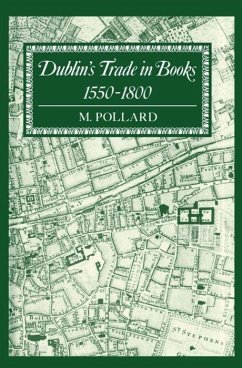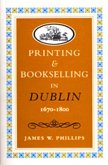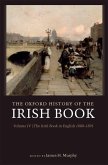The Irish book trade has hitherto been viewed as a footnote to the English trade. This is the first book-length study of Irish bookselling practices, particularly those of Dublin, in their own right. The study draws on a wealth of material - daybooks, imprints, advertisements, and the books themselves - to build up a detailed picture of the fortunes and practices of Irish bookselling. The English book trade bore heavily on the Irish, especially in the areas of legal restraints and censorship. Interestingly, there are documented instances of book-smuggling to Britain. But the study does not concentrate solely on relations with London: it looks at the market at home, the structure and economic background to the Dublin trade, and at what books were published and for whom. In particular, it examines the significant expansion of the book trade during the eighteenth century, and surveys imports and exports for the first time.
This is the first book to examine the Irish book trade as exemplified by the bookselling practices of Dublin. Previous studies have focused mainly on the English trade discussing Irish practices only as a footnote. This study focuses on Ireland, and draws on a wealth of material including daybooks, imprints, advertisements, and books themselves to build a detailed picture of the fortunes and practices of Irish bookselling. Pollard not only discusses relations with London, but looks in detail at the market at home, the structure and economic background of the Dublin trade, what books were published, and for whom. In addition, Pollard examines the significant expansion of the book trade during the 18th century, and provides the first survey of imports and exports revealing just how many books entered Ireland, and the supply of Dublin books to overseas markets.
Hinweis: Dieser Artikel kann nur an eine deutsche Lieferadresse ausgeliefert werden.
This is the first book to examine the Irish book trade as exemplified by the bookselling practices of Dublin. Previous studies have focused mainly on the English trade discussing Irish practices only as a footnote. This study focuses on Ireland, and draws on a wealth of material including daybooks, imprints, advertisements, and books themselves to build a detailed picture of the fortunes and practices of Irish bookselling. Pollard not only discusses relations with London, but looks in detail at the market at home, the structure and economic background of the Dublin trade, what books were published, and for whom. In addition, Pollard examines the significant expansion of the book trade during the 18th century, and provides the first survey of imports and exports revealing just how many books entered Ireland, and the supply of Dublin books to overseas markets.
Hinweis: Dieser Artikel kann nur an eine deutsche Lieferadresse ausgeliefert werden.






![A Catalogue of Fifteenth-Century Printed Books in Glasgow Libraries and Museums [2 Volume Set] A Catalogue of Fifteenth-Century Printed Books in Glasgow Libraries and Museums [2 Volume Set]](https://bilder.buecher.de/produkte/59/59525/59525150m.jpg)

